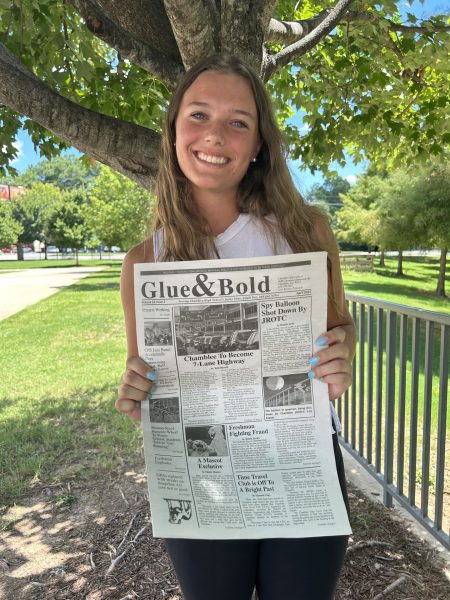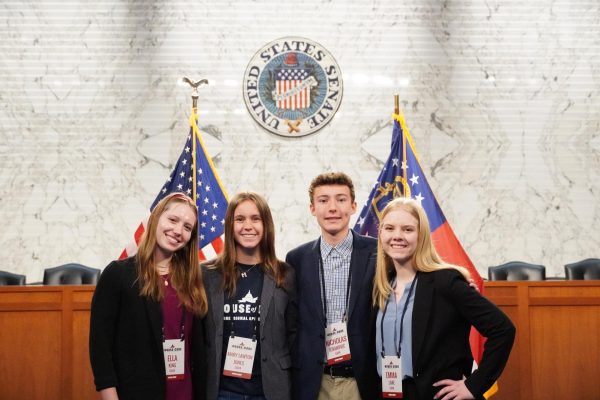When Semesters and Trimesters Collide

Demer, child, and cat
For new parents around the world, having a child is a process that requires a significant time investment. To accommodate for this, many companies give time off for new parents to give birth or adjust to parenthood. For teachers, life doesn’t stop during the school year. Many new parents who work at schools like Chamblee have different experiences with family leave.
For maternity leave, teachers can receive 12 weeks of unpaid time off.
“The way that maternity leave works for DeKalb is that you apply for [the Family and Medical Leave Act, and] it gives you 12 uninterrupted weeks of [unpaid] leave. […] You use your sick days to get paid,” said Laura Lennard, 9th grade English teacher. She recently returned from her second maternity leave after having a baby.
Helping matters is a new House Bill, Georgia HB146, which provides for three weeks of paid maternity leave for all government workers.
“I had four weeks that I could use my sick days to cover. And then there was the new bill that was signed into law in May, where I got three weeks of paid leave as a state employee,” said Lennard. “I had about three weeks where nobody paid me.”
Paid maternity leave is no guarantee here in DeKalb.
“All my paid time off is gone,” said Renee Pascale, chemistry and AP Environmental Science teacher. “Nine of the twelve weeks will be unpaid.”
Unlike teachers who can accrue sick days, newer teachers will not be able to be paid for a majority of their maternity leaves.
“A new teacher to the district doesn’t have the sick days to cover that,” said Lennard.
Regardless of payment status, leave is essential to new parents and is used in various ways.
“There’s a recovery period, because obviously you have just gone through physical trauma. And then there’s also what they call a child bonding period,” said Lennard.
Especially for mothers, familial leave is vital.
“It’s a traumatic experience on the body,” said Pascale. “Your body goes through this huge change in nine months. And then it needs time to recover.”
Teaching, which has been traditionally a woman-dominated industry, is not particularly known for supplying maternity leave for its teachers.
“For a career that’s made up of like a lot of women and is marketed as a family-friendly job. It’s highly suspect to me that there is no form of paid [maternity] leave,” said Lennard. “Why in our industry is there no support for [that]?”
Private industries, such as banking and finance, sometimes give more time off for new mothers.
“There’s more flexibility in private industry,” said Pascale. “You still have these gender norms of mom being the primary child giver. […] Even for male teachers who decide to take family leave, […] I think there just should be a little bit more flexibility.”
James Demer, an English teacher here at Chamblee, recently had a child. He didn’t receive paternity leave so instead used his paid time off.
“I took two weeks off when the baby came, and […] now I’m taking every Friday for the semester,” said Demer. “I can use one of my sick days every Friday, and they will pay me but I’m really just using up my sick days.”
Luckily for Demer, he has had a long history with the county and has amassed a large sum of paid time off.
“Over a 30-year career, you accrue a half year or a full year’s worth of days. And then […] they pay you at the end of your career for those days, but I’m just using them up now,” said Demer.
The system is not very supportive of working parents. In addition to the lack of family leave for many, COVID-19 has exasperated the need for childcare.
“Babies are labor-intensive beings and they should be with their parents,” said Demer. “We don’t have any infrastructure for little kids in this country [or] public daycares.”
In addition, a shortage of substitutes has led to issues for teachers who have taken time off.
“I’m not expecting teaching to happen on [Fridays] because there aren’t any subs,” said Demer. “I don’t think that I’ve had a sub that’s been in my room the whole day, yet.”
Some teachers who are gone for an extended period get a certified teacher to help teach the class while they are away.
“When you have a certified teacher, they know how to do lesson plans, they know how to actually teach the kids the information,” said Lennard. “It’s super important to have somebody who knows what they’re doing. For the most part, teachers can not guarantee this consistency for every day that they are out.”
“It’s not ideal to have kids bounced around from sub to sub, or even having to move classroom to classroom if you can’t get someone to cover. And the sub shortage definitely doesn’t help that,” said Lennard.
In other cases, retired teachers have returned to school to assist with teaching.
“We have been talking with DeAnn Peterson who retired last year to try and come a couple of days a week to be that knowledge base so that my students in my AP classes and in my gifted classes are not just left to teach themselves,” said Pascale.
Going on maternity leave requires extensive planning to ensure that students continue to learn even when their teacher is away.
“For anyone who’s going to go on maternity leave, they should talk to their departments,” said Lennard. “Ideally, they’re co-planning with someone so that somebody can be a voice […] that knows what’s supposed to be happening in the class.”
Across the board, Chamblee teachers have benefited from the support of others working in their department. As the saying goes, it takes a village.
“There’s no way that I could do this without the support of my colleagues. […] Dr. Wagner and Ms. Kinsler are phenomenal,” said Pascale. “The support of other teachers […] is invaluable.”
A Familiar Face Returns to Chamblee
With Pascale missing so much time out of the year, Peterson, perhaps better known as Ms. Pete, came in to teach classes as someone who is already familiar with Chamblee.
“We’re in a substitute shortage right now, so it’s pretty much you take what you can get. But because [Ms. Pete is] recently retired, we asked if she’d be willing to come back, maybe a few days a week, because we want her to enjoy her retirement, cause she worked really hard and she’s earned it. So she’ll be coming several days a week to deliver the curriculum to my AP students and my chemistry students,” said Pascale.
Peterson is coming out of retirement to help keep Pascale’s students on track.
“Whatever she’s willing to do, I will be so incredibly grateful for. I think […] she’s always been a phenomenal educator, and she’ll definitely add her own touch and perspective to the standards and to the classroom culture. But in terms of […] making sure that the students stay safe while they’re in the room, and that they are getting something out of the curriculum and the activities, I’m looking to her mostly as a facilitator. But I would be, and am very, grateful for any additional responsibilities, like grading, that she might be willing to do, but that’s not my expectation, and that’s usually not the expectation for most subs,” said Pascale.
The people who this change will affect the most are Pascale’s students, many of whom have already had teachers that have been on, or are going on, maternity leave this school year.
“It’s my second or third teacher this year that’s had something to do with maternity leave, so I’m kind of used to it at this point. We know it is a little bit frustrating, dealing with substitute teachers, because sometimes they have trouble with the grading. It’s good that Ms. Pete has already been a teacher. So she’s used to it, so she knows how to do it, so hopefully that’ll be really nice,” said Dempsey Allers (‘24), one of Pascale’s chemistry students.
“This isn’t the first time I’ve had a teacher leave for maternity leave, so I know what it’s like. But I hope we learn something,” said Trinity Walls (‘24).
Even Pascale’s AP students seem comfortable with the teaching change.
“I just wish Ms. Pascale a healthy delivery and recovery during these few months that she’s going to be gone. I’m glad Ms. Pete is able to sub and cover grading, as I’ve heard so many positive things about her as an educator from previous students,” said Samantha Canela (‘23)
There have been some worries about the lesson plans and curriculum, as students are worried that they will fall behind or not be prepared enough for tests and AP exams.
“I’m kinda nervous that the lesson plan would get messed up, but since Ms. Peterson has taught [AP environmental science] before. I think the class is in good hands,” said Krishna Srivatsa (‘23).
Pascale and Pete have been working together to ensure a smooth transition, and making sure to do what’s best for their students.
“Ms. Pete, while she has taught AP environmental science for many years, she hasn’t taught it with the new curriculum. So things are a little bit out of order, but we’re collaborating even now to make sure that the transition can be as simple as possible,” said Pascale.
Your donation will support the student journalists of Chamblee High School Blue & Gold. Your contribution will allow us to print editions of our work and cover our annual website hosting costs. Currently, we are working to fund a Halloween satire edition.

Toby Russell is a senior and editor of the Blue & Gold. In five years, he hopes finally hit submit on his college apps. If he could have dinner with anybody, it would be former Secretary of State Madeline Albright. But maybe brunch would be more hip.

Shea Parker (‘24) is a senior and staff writer for the Blue and Gold. In five years, she hopes to be done with school forever and making some money in the real world. Her three favorite things are concerts, sleeping, and her friends.










